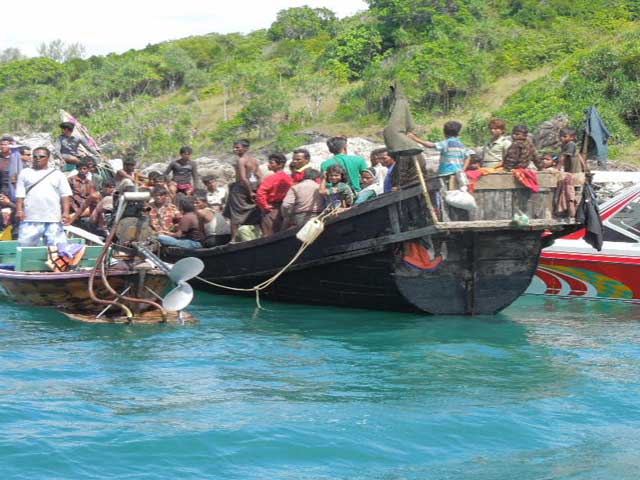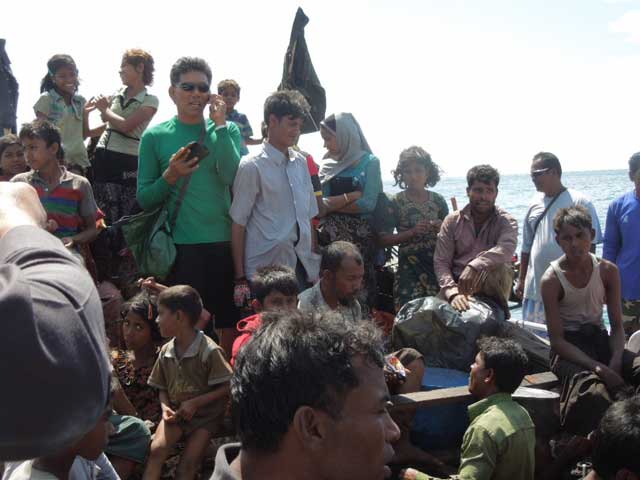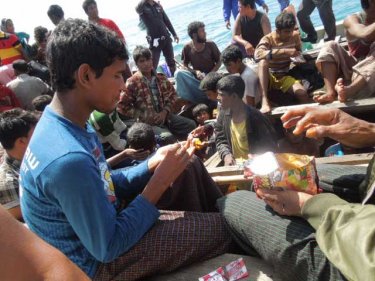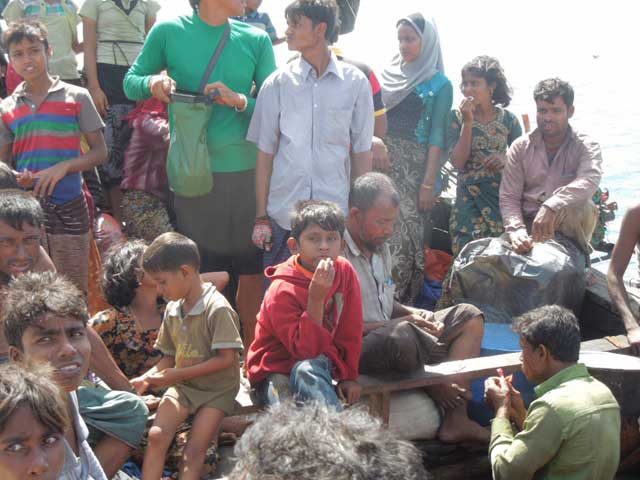
 |
Tuesday, January 1, 2013
PHUKET: A boatload of Rohingya - including women and children as young
as three - was intercepted off the holiday island of Phuket in Thailand
today.
The leader of the group of 74 told Phuketwan through an interpreter: ''Our families put to sea because there is no hope in Burma. If we stay, we will die.''
Previously, only men and boys among the persecuted Muslim minority put to sea. The family homes of thousands of Rohingya have been torched so the women and children now are also making the perilous voyages south in open boats.
Organisations connected with the Rohingya expect more than 20,000 will put to sea and voyage past Phuket this ''sailing season'' between October and April.
It was disturbing to see young children among the passengers in the exposed open boat today. Hands reached out eagerly for food and cigarettes.
Phuketwan rented a tourist speedboat and was able to interview the group of 74 alongside their boat as Royal Thai Navy ratings replenished their fuel and supplies.
Under Thailand's ''help on'' policy, the group will be told they cannot land but have been given assistance to reach their preferred destination, Malaysia.
Mohamad, 45, told us: ''We were heading south with a much larger boat but we ran out of fuel so we had to stop here.''
The larger boat is believed to be the vessel that recently dropped about 500 passengers off the holiday island of Langkawi in Malaysia, with one man dying when struck by a propeller.
Off the southern Phuket holiday island destination of Rawai this morning, we reached the Rohingya boat in about five minutes.
Rawai is a popular setting off point for tourist visitors who would have been exploring reefs and other island beaches today without realising the epic human drama of the boatpeople was just metres away.
Of the 74 people crowded into the open boat, said Mohamad, 10 were children under the age of 10. There were three three-year-olds, two boys and a girl.
Forteen women on board looked to Phuketwan to be mostly young teenagers.
The children keenly chewed on snacks given to them by local Chalong police and some of the men enjoyed cigarettes.
The hold below the open deck is also packed with people. Mohamad said they had been sailing for 13 days, departing from Maungtaw, in Rakhine state, where so-called ''community violence'' has caused death and destruction since June.
Mohamad said the fee asked by the people smuggler was 400,000 kyat per person.
Phuketwan has been covering the Rohingya saga since 2008 but this is the first time we've been able to intercept a group at sea.
Other boatloads have landed on Phuket and along the Andaman coast from time to time.
Usually they are described as ''Burmese'' - although the Rohingya are denied citizenship in Burma - and trucked straight back to the Thai-Burmese border.
The children waved to us as the speedboat pulled away to head back to Phuket.
Once they are ready and fully refuelled, the Rohingya's ''holiday'' off Phuket will be at an end.
Burma denies genocide against the Rohingya, who are hated by virtually all of Burma's Buddhist majority.
But most observers accept that a tactictly approved policy of ethnic cleansing is now forcing thousands of them to flee their homeland any way they can.
The leader of the group of 74 told Phuketwan through an interpreter: ''Our families put to sea because there is no hope in Burma. If we stay, we will die.''
Previously, only men and boys among the persecuted Muslim minority put to sea. The family homes of thousands of Rohingya have been torched so the women and children now are also making the perilous voyages south in open boats.
Organisations connected with the Rohingya expect more than 20,000 will put to sea and voyage past Phuket this ''sailing season'' between October and April.
It was disturbing to see young children among the passengers in the exposed open boat today. Hands reached out eagerly for food and cigarettes.
Phuketwan rented a tourist speedboat and was able to interview the group of 74 alongside their boat as Royal Thai Navy ratings replenished their fuel and supplies.
Under Thailand's ''help on'' policy, the group will be told they cannot land but have been given assistance to reach their preferred destination, Malaysia.
Mohamad, 45, told us: ''We were heading south with a much larger boat but we ran out of fuel so we had to stop here.''
The larger boat is believed to be the vessel that recently dropped about 500 passengers off the holiday island of Langkawi in Malaysia, with one man dying when struck by a propeller.
Off the southern Phuket holiday island destination of Rawai this morning, we reached the Rohingya boat in about five minutes.
Rawai is a popular setting off point for tourist visitors who would have been exploring reefs and other island beaches today without realising the epic human drama of the boatpeople was just metres away.
Of the 74 people crowded into the open boat, said Mohamad, 10 were children under the age of 10. There were three three-year-olds, two boys and a girl.
Forteen women on board looked to Phuketwan to be mostly young teenagers.
The children keenly chewed on snacks given to them by local Chalong police and some of the men enjoyed cigarettes.
The hold below the open deck is also packed with people. Mohamad said they had been sailing for 13 days, departing from Maungtaw, in Rakhine state, where so-called ''community violence'' has caused death and destruction since June.
Mohamad said the fee asked by the people smuggler was 400,000 kyat per person.
Phuketwan has been covering the Rohingya saga since 2008 but this is the first time we've been able to intercept a group at sea.
Other boatloads have landed on Phuket and along the Andaman coast from time to time.
Usually they are described as ''Burmese'' - although the Rohingya are denied citizenship in Burma - and trucked straight back to the Thai-Burmese border.
The children waved to us as the speedboat pulled away to head back to Phuket.
Once they are ready and fully refuelled, the Rohingya's ''holiday'' off Phuket will be at an end.
Burma denies genocide against the Rohingya, who are hated by virtually all of Burma's Buddhist majority.
But most observers accept that a tactictly approved policy of ethnic cleansing is now forcing thousands of them to flee their homeland any way they can.



No comments:
Post a Comment